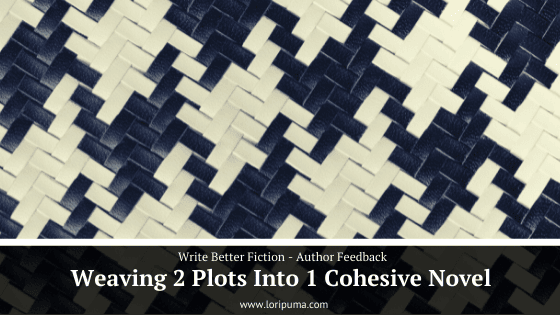The One Question Your Novel Must Answer
/What can you do to make your novel more compelling? Learn why authors need to answer one crucial question, and see how one sci-fi/fantasy author can refine his question to help craft a novel readers can’t put down.
December’s author is Glenn Eisenberry, who’s writing a sci-fi/fantasy novel. Here’s his summary of the story:
A conflict resolution expert on a colonization ship hides from relationships. He is taken from his work to train an organic computer housed in an android body.
She shaped her body from a formless whole and only has the basic inception data. The two are sent to investigate a possible colonization site because it is too far for a probe. Their craft is placed deep inside a mountain. It is a fantasy world which they must engage in to fulfill a role as messengers.
In terms of what he’d like feedback about, Glenn says:
The ground rules of a story. I love what I have written, but is it correct? I have never had an editor or beta readers, so I don’t know what mistakes I have made.
The “ground rules” of fiction is a broad topic, so let’s make it a little more specific. What’s going to make this novel a fun reading experience? How can Glenn keep the reader’s attention for the length of a book? To do that, we’re going to look at the one question every novel must answer.
The crucial question your novel must answer
You can sum up great novel in a single question that conveys the essence of what the book is about. Questions in a particular genre are similar, but each novel will have a question that is specific to its story. If you can’t describe your novel in a single sentence, then you’ve got a major problem with the foundation of your story.
That problem may show up as a meandering plot, a middle (or ending) that feels impossible to write, or reviews that say “I just never got into this story”, or “The pacing was uneven.” Refining a story idea so that it’s possible to express it in a single, succinct Story Question is a step that many novelists don’t take. That’s too bad, because one of the reasons that readers keep turning pages in a good novel is so that can get the answer to this specific question.
For example, you could say Andy Weir’s novel The Martian answers the question “Will Mark Watney survive on Mars and make it back home to Earth?” Similarly, Suzanne Collins’s novel The Hunger Games answers the question “Will Katniss Everdeen survive and win the Hunger Games?” You’d dedicate several hours of your life to getting the answers to those questions, wouldn’t you?
As you may have noticed from the examples above, a lot of fantasy and sci-fi Story Questions can be expressed in the form*:
Will [HERO] survive [THREAT] and [ACHIEVE GOAL]?
Having a Story Question with a specific threat and a concrete goal can help you while you’re writing the novel and when you’ve finished it and need to persuade people to read it. While you’re writing and revising, a specific Story Question helps you identify when your plot meanders and self-edit more effectively. When you’re trying to sell your novel, a compelling Story Question helps you succinctly express what the story is about so you can attract the readers who will be most excited about your book. Your Story Question helps you write your book description, query letters, and promotional materials.
Let’s look at how Glenn can refine his Story Question, so he can keep readers turning pages and explain what his novel is about to prospective readers.
*If you’d like to see alternative forms for Story Questions, check out this free guide on 4 Essential Skills.
Will your fantasy novel leave readers hungry for more of your writing? Take the quiz to see what’s working and what comes next.
A must-answer Story Question for Glenn’s novel
Glenn’s novel is probably using an action plot, so the Story Question can be expressed in this form:
Will [HERO] survive [THREAT] and [ACHIEVE GOAL]?
Even if Glenn’s Story Question, doesn’t quite fit this form, whatever form it does take will include the same components: the hero, the hero’s goal, and the obstacles or threats that make it difficult for the hero to reach their goal.
Let’s go through each of the pieces and see how we can make each one more specific and concrete.
First up, who is the hero? And why is he the protagonist for this story?
Here’s what Glenn said about the hero:
Solumnar has two masters and a doctorate before the age of 23. He lost his parents when he was 8 yrs old. The three organic computers that oversee the ship were grooming him for a mission he knew nothing about.
Excellent. Our hero’s named Solumnar, and he’s got a lot of training. It would be even better to know more specifics about why Solumnar is being groomed for this mission. We know from the synopsis that he’s supposed to be training his android partner, but we don’t know what he’s training her for, or why he was chosen for this task. What’s so special about him that he’s chosen for a special mission, instead of someone else? What do those computers see in Solumnar that they can’t get in anyone else?
Second, what’s the threat?
The villain is a collective of three organic computers called The Three. But they aren’t the only trouble that Solumnar will face. We know from the premise that Solumnar is being sent to explore a colonization site. From Glenn’s description of his plot we get hints about why Solumnar was sent on his mission and the kinds of challenges he will face::
The Three recreate themselves in a Droid body. Solumnar is one of the “experiences” their child is to bring back to them when she is taken apart and absorbed. Their plan is thwarted when the craft Solumnar and their child is seized from space and placed inside a mountain Hall where others will eventually come to live. The world they encounter is overrun by the evil peoples. Solumnar and (Celeste) are given the task of Herald to bring the truth about the One who created all things which the Father of all Dragons obscured with many lies so even the good deities have lost their way. He and Celeste are given abilities neither could imagine. They are considered heroes by the good peoples. Along the way Solumnar falls in love with Celeste despite her not being human. Then he learns the people of the ship will be coming in the emergency craft. He blames himself for their coming.
It looks like The Three want to send Solumnar on this mission because they need him to collect something for them they can’t get themselves. There is also a threat posed by the group that seizes Solumnar’s spacecraft, groups of evil people on a planet, and maybe also by Celeste, the android/romantic interest, since she was sent by the villain.
To make the threat more specific, we want to know how each of these group’s impacts Solumnar’s ability to accomplish his goal for the story.
So, we need to know more about the goal.
Solumnar and Celeste are originally sent on a mission by The Three. Their mission (a.k.a. goal) is to retrieve “experiences”, but it’s not clear why this is critical. Why do The Three need these experiences? Are The Three in danger if the experiences aren’t collected? Will the experiences give The Three powers that they don’t already have? What do The Three gain by sending Solumnar on a mission over just tossing him out an airlock? And why do they need to send Celeste along with him?
To make the goal more specific, we want to identify a concrete end result. Since The Three are both the villain and the mentor, what do they tell Solumnar about his task? Is his mission to retrieve an item? Capture a person? Negotiate a treaty? Start a war? Persuade a politician to take a particular action? Impersonate a deity and become the high priest of the mountain people?
Additionally, what does Solumnar have to lose on this mission? Are there other characters who Solumnar loves who will suffer if Solumnar fails? Which characters will be victims if The Three get what they want? How do the group who captures Solumnar’s spacecraft, the evil peoples, and Celeste thwart Solumnar’s progress toward reaching his goal? Can you make the obstacles that each threat creates unique?
When readers know what end result a hero is trying to reach, and the consequences of success and failure, Because they know what the hero is trying to accomplish, when obstacles pop up, they’re primed to worry about the hero and his allies. They know what’s at stake if Solumnar fails.
How close are you to crafting a novel readers won’t be able to put down? Take a quiz to see what’s working and what comes next.
Next Steps for Glenn
I listed many questions above, but these are the ones that I’d encourage Glenn to focus on.
What’s the goal?
Why is the goal difficult for the hero?
Why is the hero committed to the goal?
What’s the threat that makes achieving the goal difficult?
Here’s an example of what the answers might look like:
What’s the goal? - Retrieve a new data crystal from a dangerous place and help The Three survive.
Why is the goal difficult for the hero, but not completely impossible? Solumnar refuses to use force. He’s an expert in resolving conflicts peacefully.
Why is the hero committed to the goal? Solumnar wants to save The Three, whom he loves like family.
What’s the threat? Ruthless clan, dangerous planet, Celeste.
In the form of a single question (Will HERO survive THREAT and ACHIEVE GOAL?):
Will a nonviolent conflict resolution expert survive a dangerous planet, a ruthless clan, and a beautiful but deadly android to get the data crystals the organic computers who raised him need to survive?
A good Story Question persuades readers that a book is worth a whole novel’s worth of reading time, because it shows us that the hero is going to do something difficult and amazing. He’s pursuing an ambitious goal under difficult circumstances.
Enjoy this post? Join my email list so you’ll know when I publish the next author feedback post.
Or maybe you’ve got a fantasy, sci-fi, romance, mystery, or thriller for adult or young adult readers that you want feedback on? Submit your story.









